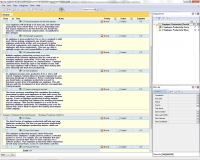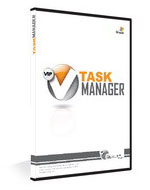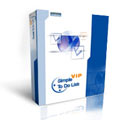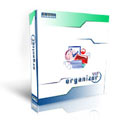|
Task Management Software |
 |
|
|
|
|
| |
|
 TESTIMONIALS TESTIMONIALS
|
|
"...This is an excellent program. I'm so glad that I stumbled on to this when researching for task management programs. Very low learning curv, quite flexible, and the price is right. Tried at least 20 other programs, either too complicated, too expensive, or poor documentation..."
Chad Lindsey -
Honolulu, HI
|
|
|
|
|
|
|
|
Employee Productivity Checklist |
|
|
|
|
|
|

 |
This Employee Productivity Checklist consists of two categories that describe the key factors and measures of productivity. The checklist will be helpful for HR managers, executives and team leaders assigned to improving productivity of employees.
|
| Order 750 checklists in MS Word and PDF printable format at $49.99 USD only. |
BUY NOW!  |
- Employee Productivity Factors.
- Factors. There are several major factors that drive high-level productivity of employees. These factors are itemized below. By following the factors, you can keep your staff productive while minimizing ineffective use of resources.
- Make work fun. When your employees consider their work as an enjoyable experience, they are likely to achieve a high level of job satisfaction. You should try to give your employees an opportunity to experience something positive or funny from their work. For example, you can decorate workplaces with elements of fun.
- Reward employees for their best attempts. Your employees will be likely to do more jobs and show better productivity if you reward them. Try to give demanding tasks that require employees to do their best but you should also announce rewards (monetary compensation, recognition) for their attempts.
- Make right assignments. An employee is more productive if he or she is assigned to right work. Before making assignments you should conduct studies and assessments to define critical job requirements and compare skills and abilities of your employees with these requirements. Then you are able to optimally assign roles and responsibilities to staff members.
- Communicate easily. Multiple surveys prove that communications between employees play the central role in managing employee productivity. That’s why you need to remember about the importance of communications. Employee communications should be open to any member of your staff. Then your employees will be likely to spend their working time more efficiently and work more productively.
- Train employees. An employee becomes more productive if he or she is well trained. Employee training allows increasing competencies and improving knowledge of employees. Before conducting training, you should make a research to determine current level of knowledge per employee. This will help you with the development of more effective and applicable training programs.
- Improve working environment. This factor concerns everything that constitutes the working environment in which your employees do their tasks every day. It is about technology, operations process, equipment, software systems. Create a productivity tracking template and add there everything that influence the working environment of your company. Then use this template as a to-do list for improving productivity. By completing your to-do list step-by-step, you’re likely to improve the working environment of the company.
- Employee Productivity Measures.
- Metrics. The listed factors of employee productivity will help you keep employees productive. But how can you measure productivity? There are several metrics, which are listed below.
- Hours Per Product. This measure shows how many working hours employees usually spend to produce a selected product or service. For example, you can determine that your developers spend 28 labor hours to write code lines for a software product. Then productivity will be dependent on how many actual hours accrue to each written code line.
- Products Per Hour. This metric of statistics allows counting how many items of a selected product/service each worker completes per hour, day or week. For example, you can measure how many code lines developers write per hour.
- Ratio of Productive Hours. This metric is also called ratio. It shows a difference between labor hours actually spent on activities that bring value against activities with no value. For example, a time logging system allows you to measure how long each employee is logged into this system during workday and then calculate a percentage of total time. Meetings, training sessions, lunches and other time spent away from the system will be considered as non-productive employee time.
| Order 750 checklists in MS Word and PDF printable format at $49.99 USD only. |
BUY NOW!  |
|





 |
CentriQS Tasks Management Solution 
Looking for multi-user task management software? Try CentriQS complete task management solution for planning, tracking and reporting tasks, projects, and schedules. Increase productivity of your small business or office by better organizing your employees' tasks and time.
 FREE Download CentriQS FREE Download CentriQS
|
|
|
|
|
|
|
|
|
|
CentriQS  -15% OFF -15% OFF |
All-in-one business management software
for small and midsize enterprises |
 |
|
|
| VIP Task Manager |
Multi-user project management software
to plan, schedule and track project tasks. |
 |
|
|
| VIP Checklists
|
More than 750 ready-to-use to-do lists
to plan your personal and business life |
 |
|
|
| VIP Team To Do List |
Professional task management software
to make and send team todo lists by email |
 |
|
|
| VIP Organizer |
Personal time management software
to organize time at home and at work |
 |
|
|
| VIP Simple To Do List
|
Simple and effective to-do list software
to plan daily chores, trips, wedding, etc. |
 |
|
|
|
|
|
|
|